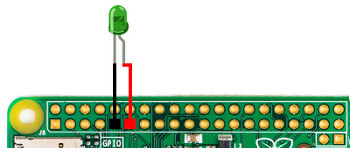Using Raspberry Pi GPIO ports in C/C++ with WiringPi library
Connect to RPI with SSH and Xephyr
We will use Raspbian Jessie.
First, on Ubuntu:
$ Xephyr -ac -br -keybd ephyr,,,xkbmodel=pc105,xkblayout=es -noreset -screen 1280x720 :1
Then, on RPI:
$ DISPLAY=:1 ssh -Y pi@10.42.0.246
$ startlxde
Installing Wiring Pi libraries
Update and upgrade the system:
$ sudo apt-get update
$ sudo apt-get upgrade
Install Git:
$ sudo apt-get install git-core
Clone Wiring Pi from GitHub:
$ cd ~
$ git clone git://git.drogon.net/wiringPi
Go to the folder and pull:
$ cd wiringPi
$ git pull origin
Then, compile Wiring Pi:
$ sudo ./build
That's all!!, you can verify that Wiring Pi is installed correctly and chech the version:
$ gpio -v
gpio version: 2.44
Copyright (c) 2012-2017 Gordon Henderson
This is free software with ABSOLUTELY NO WARRANTY.
For details type: gpio -warranty
Raspberry Pi Details:
Type: Pi 3, Revision: 02, Memory: 1024MB, Maker: Embest
* Device tree is enabled.
*--> Raspberry Pi 3 Model B Rev 1.2
* This Raspberry Pi supports user-level GPIO access.
Example: Controlling led in C/C++ with Wiring Pi
Check the pins of the RPi 3:
$ gpio readall
+-----+-----+---------+------+---+---Pi 3---+---+------+---------+-----+-----+
| BCM | wPi | Name | Mode | V | Physical | V | Mode | Name | wPi | BCM |
+-----+-----+---------+------+---+----++----+---+------+---------+-----+-----+
| | | 3.3v | | | 1 || 2 | | | 5v | | |
| 2 | 8 | SDA.1 | IN | 1 | 3 || 4 | | | 5v | | |
| 3 | 9 | SCL.1 | IN | 1 | 5 || 6 | | | 0v | | |
| 4 | 7 | GPIO. 7 | IN | 1 | 7 || 8 | 1 | IN | TxD | 15 | 14 |
| | | 0v | | | 9 || 10 | 1 | IN | RxD | 16 | 15 |
| 17 | 0 | GPIO. 0 | IN | 0 | 11 || 12 | 0 | IN | GPIO. 1 | 1 | 18 |
| 27 | 2 | GPIO. 2 | IN | 0 | 13 || 14 | | | 0v | | |
| 22 | 3 | GPIO. 3 | IN | 0 | 15 || 16 | 0 | IN | GPIO. 4 | 4 | 23 |
| | | 3.3v | | | 17 || 18 | 0 | IN | GPIO. 5 | 5 | 24 |
| 10 | 12 | MOSI | IN | 0 | 19 || 20 | | | 0v | | |
| 9 | 13 | MISO | IN | 0 | 21 || 22 | 0 | IN | GPIO. 6 | 6 | 25 |
| 11 | 14 | SCLK | IN | 0 | 23 || 24 | 1 | IN | CE0 | 10 | 8 |
| | | 0v | | | 25 || 26 | 1 | IN | CE1 | 11 | 7 |
| 0 | 30 | SDA.0 | IN | 1 | 27 || 28 | 1 | IN | SCL.0 | 31 | 1 |
| 5 | 21 | GPIO.21 | IN | 1 | 29 || 30 | | | 0v | | |
| 6 | 22 | GPIO.22 | IN | 1 | 31 || 32 | 0 | IN | GPIO.26 | 26 | 12 |
| 13 | 23 | GPIO.23 | IN | 0 | 33 || 34 | | | 0v | | |
| 19 | 24 | GPIO.24 | IN | 0 | 35 || 36 | 0 | IN | GPIO.27 | 27 | 16 |
| 26 | 25 | GPIO.25 | IN | 0 | 37 || 38 | 0 | IN | GPIO.28 | 28 | 20 |
| | | 0v | | | 39 || 40 | 0 | IN | GPIO.29 | 29 | 21 |
+-----+-----+---------+------+---+----++----+---+------+---------+-----+-----+
| BCM | wPi | Name | Mode | V | Physical | V | Mode | Name | wPi | BCM |
+-----+-----+---------+------+---+---Pi 3---+---+------+---------+-----+-----+
Use the next connection for wiring:

Create the file
#include <wiringPi.h>
int main (void)
{
wiringPiSetup();
pinMode(0, OUTPUT);
int i = 0;
for (i = 0;i<10;i++){
digitalWrite(0, HIGH);
delay(500);
digitalWrite(0, LOW);
delay(500);
}
return 0 ;
}
Compile
$ gcc -Wall -o blink blink.c -lwiringPi
Or compile
$ gcc -Wall -o blink blink.cpp -lwiringPi
Execute using:
$ sudo ./blink
Resources
- http://www.mnp.cl/post/instalar-wiringpi-raspberry-pi-gpio-c.
- http://www.mnp.cl/post/controlar-led-gpio-raspberry-pi-c.